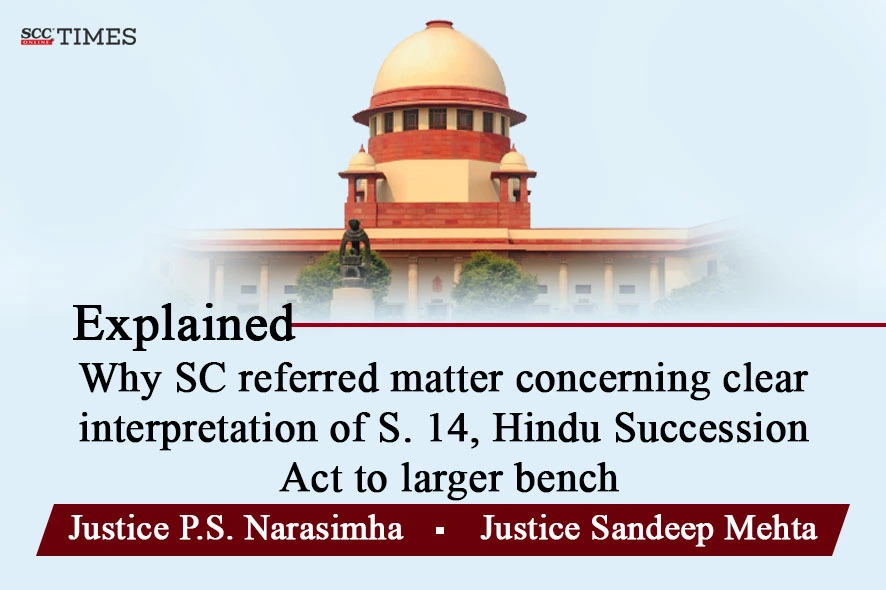Supreme Court: While considering the instant appeal revolving around Section 14 of the Hindu Succession Act, 1956, the Division Bench of P.S. Narasimha and Sandeep Mehta, JJ., noted that there are many decisions which are not only inconsistent with one another on principle but have tried to negotiate a contrary view by distinguishing them on facts or by simply ignoring the binding decision. Hence the Court was of the view that there must be clarity and certainty in the interpretation of Section 14 of the Hindu Succession Act.
Therefore, the Court directed the Registry to place the instant order along with appeal paper book before the Chief Justice of India for constituting an appropriate larger bench to reconcile the principles laid down in various Supreme Court decisions concerning Section 14 and for restating the law on the interplay between sub-clauses (1) and (2) of Section 14.
Background:
The appellant is the purchaser of the suit scheduled property under a sale deed dated 02-03-1981 executed by the wife of the testator, who was the original owner of the property. The testator during his lifetime executed a will dated 03-03-1965 in favour of his wife, thereby creating a life estate in her favour. After the execution of the will, the testator died on 11-10-1965. His wife executed a sale deed in favour of the appellant herein leading to the son and grandson of the appellant instituting a suit for declaration that the sale deed is void and sought delivery of possession.
The Trial Court relied on decision in Tulsamma v. Sesha Reddy, (1977) 3 SCC 99, and held that the property given to the wife of testator is in the nature of maintenance and such a preexisting right shall enlarge into full estate; therefore, the suit was dismissed. Similarly, the First Appellate Court dismissed the appeal and affirmed the decision of the Trial Court following the principle in Tulsamma.
However, Punjab and Haryana High Court reversed the afore-stated concurrent findings of the courts below only on a question of law and observed that the correct principles were laid down in the decision of Sadhu Singh v. Gurdwara Sahib Narike, (2006) 8 SCC 75.
Court’s Assessment:
Perusing the matter, the Court noted that in Mangal Singh v. Rattno, 1967 SCC OnLine SC 35, the court explained the scope and ambit of the expression of “any property possessed by a female Hindu” in Section 14(1) of HSA. In Seth Badri Prasad v. Kanso Devi, (1969) 2 SCC 586, the Court had held that Section 14(2) is more in the nature of a proviso or an exception to Section 14(1) and it comes into operation if acquisition of the property by a female Hindu is made through any of the methods mentioned therein for the first time and without their being any pre-existing right.
Referring to Tulsamma, the Court took note of observation made by Bhagwati, J., wherein he stated that Section 14 was a classic instance of a statutory provision which, by reason of its inapt draftsmanship, has created endless confusion for litigants and has proved to be a paradise for lawyers. The Court pointed out that Tulsamma enunciated the principles that govern disposition of property in favour of Hindu female.
However, the Court pointed out that Karmi v. Amru, (1972) 4 SCC 86, neither analysed the provisions of the Act nor considered the purpose and object of Section 14 and the precedents on this subject. However, the principle on the basis of which the Court in Karmi decided the case Resonated in many subsequent decisions which have in fact followed it as a precedent.
The Court further highlighted that in Gumpha v. Jaibai, (1994) 2 SCC 511, it was held that Parliament never intended to confirm a higher right on a Hindu female, than what was enjoyed by a male Hindu. Possession under Section 14(1) must be legal, therefore if the position is placeable to a will, then she cannot get a higher right than what is stipulated in the document. A combined reading of the Sections is that when the law attempts to remove the disability imposed by customary Hindu law, it does not enlarge and exchange the right she will get under a will.
Further taking note of Sadhu Singh (supra) as relied on by the High Court, the Court pointed out the principles enunciated in the case. In Sadhu Singh, it was stated that the essential ingredients for determining application of Section14(1) are – antecedents of the property, the possession of the property as on the date of the Act and the existence of a right in the female over it, however limited it maybe. Any acquisition of possession of property (not right) by a female Hindu after the coming into force of the Act, cannot normally attract Section 14(1) of the Act.
The Court further noted that except Karmi, the decisions in Gumpha and Sadhu Singh were made by 2-Judge Benches. The Court further pointed out that as of date, there are at least 18 judgments from Supreme Court comprising decisions from two and three Judge benches that are varying and sometimes inconsistent with the view taken in Tulsamma’s case. While arriving at their respective decisions, these judgments sought to explain, distinguish, negotiate or ignore the principles in Tulsamma and in the process they have either contradicted Tulsamma or implicitly departed from its principles sub silentio.
“Almost four decades after the judgment in Tulsamma, we have two streams of thoughts”. While the first applies principles in Tulsamma as an inviolable principle steadfastly holding that property possessed by a Hindu female before or after the commencement of the Act shall be held by her as a full owner. The other seems to be evolving from case to case, influenced by, (i) the method and manner by which the Hindu female is possessed of the property, (ii) the instrument through which the right is acquired, and (iii) the time at which such possession takes place, to mention a few.
The Court pointed out that the issue is of utmost importance as it affects the rights of every Hindu female, her larger family and such claims and objections that may be pending consideration in almost all original and appellate courts across the length and breadth of the country. It is absolutely necessary that there must be clarity and certainty in the position of law that would govern proprietary interests of parties involving interpretation of Section 14.
CASE DETAILS
|
Citation: Appellants : Respondents : |
Advocates who appeared in this case For Petitioner(s): For Respondent(s): |
CORAM :





